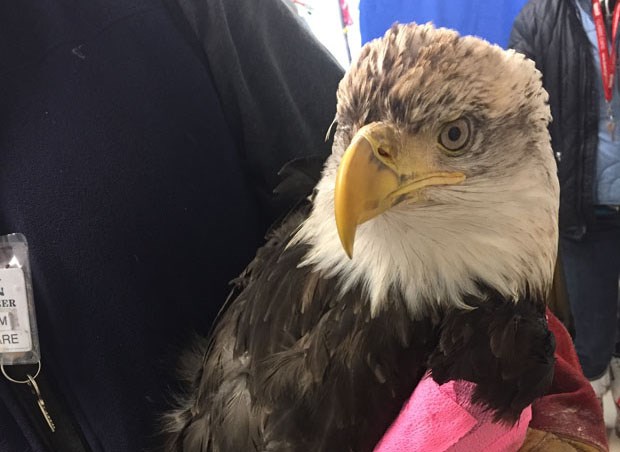A wildlife rehabilitation organization is raising the alarm after another bald eagle was electrocuted when it hit some power lines in Delta.
Orphaned Wildlife Rehabilitation Society (OWL) said the male eagle named Flash, is one of 47 birds that have been injured or killed this year after hitting power lines. It’s a staggering 30 per cent increase over last year.
“Two have lived, the rest have been DOA. It’s usually a pretty nasty situation when they hit the power lines,” said raptor care manager Rob Hope, adding the prognosis for Flash is not promising.
Most of the incidents have been reported between 88th Street, 64th Street, the dike and Highway 10, said Hope.
“Ultimately, the easiest solution is to bury all the power lines, but we know that is not going to happen,” said Hope. “BC Hydro has done a few power poles in the area to try and minimize the amount of electrocutions.”
Hope said he suggests it could be something as simple as an extender on the top of the power poles, basically a metal bar with a two-by-four across the top, which would give an extra three to four feet from the top of the power lines to the perch spot for the birds, so when they land or take off, they are not near the actual lines themselves.
“It’s a cheap and inexpensive fix and to get it done would be minimal. You would probably save a lot more birds,” he said.
BC Hydro spokesperson Mora Scott said they continue to work cooperatively with groups like OWL year round to address these issues.
“We face numerous challenges with wildlife and birds coming into contact with our equipment and wherever possible we try and prevent it,” said Scott. “What we are doing right now is that we track and report bird collisions so we can identify the problem areas and then install equipment to protect the birds.”
She said over the years BC Hydro has noticed a number of eagle perch contacts and collisions with certain sections of power lines in the Lower Mainland including Delta and Vancouver Island, resulting in birds getting injured and power outages.
“To protect the eagles from our equipment we basically build perches and guards as well as platforms and diverters. These bird diverters, for example, can be installed on the lines and they reflect and glow in the dark and increase the visibility of the line to allow the birds to see the obstruction ahead of the time,” said Scott. “We certainly will continue to share information with OWL because that information is really important for us to identify where the trouble spots are so we can install measures on a priority basis.”
Hope said more needs to be done, especially between December and March when the abundance of eagles are in the area.
“Because there are no trees to perch on, the next best thing is a hydro pole of course because it is high and they can scan from above, but unfortunately when they are taking off or landing and they hit those lines, it’s game over,” said Hope. “We wanted to bring this to the attention of BC Hydro and bring this to the public’s attention. This is something that needs to be done. Whether we have a direct meeting with BC Hydro to figure a way to do this it’s hard to say, but we want to get people talking so we can try and save as many of these birds as we can. We are not going to save 100 per cent of them, but even if we could cut our numbers in half that is still better than nothing.”



